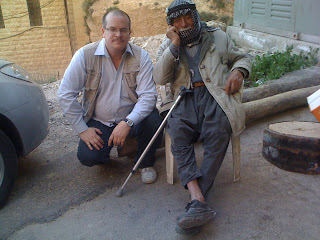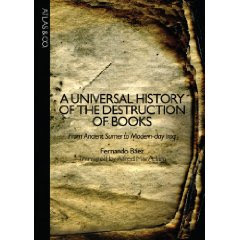Auto-da-Fé

Se fortalecen los buenos comentarios en Estados Unidos del clásico
de Fernando Báez, quien ha estado estas semanas
de gira por todo el Medio Oriente,
ojalá nos traiga nuevas pronto.
Intellectual Affairs
Auto-da-Fé
April 14, 2010
By Scott McLemee
On April 14, 2003 -- seven years ago today, and just over two weeks before George W. Bush declared “the end of major combat operations in Iraq” – the National Library in Iraq burned down. About a million books were destroyed; another blaze consumed several million documents at the National Archive. University libraries throughout Iraq met similar fates. Meanwhile there was looting of museums that contained some of the oldest-known human records -- composed with reeds on pieces of moist clay, some five thousand years ago.
To quote Donald Rumsfeld from one of his discourses on Stoic philosophy: “Stuff happens.” Perhaps we should look on the bright side. The records of Iraq’s Ministry of Oil were spared – their integrity secured through the carefully-prepared deployment of U.S. troops.
Fernando Báez, the director of Venezuela’s National Library, visited the country a few weeks later and saw fragments of Iraq’s cultural patrimony being sold in the street for pennies each. The English translation of Báez’s A Universal History of the Destruction of Books (first published in Spain in 2004) has appeared in paperback from Atlas & Co., just in time to mark this terrible anniversary.
The ruins in Baghdad were not the first he had seen. In 1999, Báez had been part of a team that inspected what remained of the National Library in Sarajevo, where 1.5 million volumes and more than 10,000 manuscripts were destroyed by firebombing during the civil war. On that tour, a poet had told him, “Each destroyed book is a passport to hell.” The pages of his Universal History describe hundreds of occasions of biblioclasty and libricide from scores of countries – beginning in ancient Sumer, where the first libraries gathered cuneiform tablets. One of the surviving documents includes a ruler’s order, during a war, “to reduce the country and the city to ruins.... he had fixed as their destiny the annihilation of their culture.” This is at least more forthright than "Stuff happens."
Báez’s work has overtones from the writings of Jorge Luis Borges -- another librarian, as it happens. Its title calls to mind both the older author's bibliocentrism (“The Library of Babel”) and his crime fiction (A Universal History of Infamy). Báez himself comes across as something like a Borgesian character, given to assembling, but only obliquely integrating, the most far-flung bits of erudition -- much of it gathered by force of obsession.
In that regard, A Universal History also resembles Robert Burton’s The Anatomy of Melancholy (1621), which is the prototype of the learned miscellany. While not technically a librarian, Burton was a fervent book collector, and his Anatomy is, in part, a meditation on the complicated relationship between reading and the rest of one’s state of mind.
Borges was a consummate ironist, and Burton often wrote with a satirical edge. Báez seems altogether more earnest sort. He traces his preoccupation with the topic at hand to the horror of witnessing, as an adolescent, the ritual of students burning their textbooks at the end of the school year. It was “a tradition as contemptible as it is ancient,” he writes, sounding a bit indignant that still his classmates mocked him for protesting.
Báez quotes some remarks on this practice by Salvador Garcia Jimenez:
“At one of the upper schools to which I was sent as a teacher, students burned several books at the end of the school year out on the basketball court. The faculty made itself ridiculous by standing there gaping, not knowing the key Freud gave to understanding that action with his interpretation of an episode from the childhood of Goethe. When Goethe throws the china out of the window after his brother’s birth, he’s carrying out a symbolic act through which he shows his desire to throw the baby out of the window because the baby has disturbed his world. For those students, the literature manual they toss on the fire represents their demanding, stupid, and pedantic schoolmarm.”
The tradition remains alive. Báez has updated his book since its initial appearance and mentions several recent incidents of textbook sacrifice. One reportedly occurred in the summer of 2007 when a student receiving her master’s degree in library and information studies from Florida State University “celebrated the end of her formal scientific education by burning her books.”
An appalling story, if true -- but here we run up against the book’s most obvious failing: The notes at the back give very detailed source information on some points, and none at all on others. I spent a little while trying to locate an online account of the Florida State story, with no success. Browning Brooks, the director of news and public affairs at FSU, had never heard of it, and he wondered if perhaps it had occurred at another school. This may be the academic equivalent of an urban legend.
In his opening pages, Báez encourages anyone so inclined to dip into A Universal History at random. Ignoring this, I read the book in traditional fashion, but can see that the author’s advice is sound. While presented in more or less chronological order, its coherence is that of a scrapbook, rather than a narrative. Báez offers some very provisional speculations on the urge to destroy books, but they really only apply in some cases. After all, plenty of titles have been lost to us through neglect or accident, rather than by dint of some destructive impulse.
But however one reads it, in linear order or by hopscotch, this is clearly the work of an old-fashioned cultural humanist who feels reverence, not for the past, as such, but for memory – and horror at the cruelty implicit in its willful destruction.
“The book is an institution of memory for consecration and permanence,” Báez writes, “and for that reason should be studied as a key element in society’s cultural patrimony.... There is no identity without memory. If we do not remember what we are, we don’t know what we are. Over the centuries, we’ve seen that when a group or nation attempts to subjugate another group or nation, the first thing they do is erase the traces of its memory in order to reconfigure its identity.... Only through the destruction of books can the murder of memory be accomplished.”
Go to comments (9) »
Links:
http://www.insidehighered.com/views/mclemee/mclemee285#Comments

Comments
Qué buena foto, Báez parece
que adoptó el nomadismo!!!!!!!!
Felipe, San Juan de los Morros